As the new coronavirus of 2019 has continued to spread around the world, officially reaching a pandemic designation I thought I needed to update my thoughts from A Virus of Ultimate Horror, which I began writing in late January and shared early February of this year. This real-life horror story is about even more than the illness but also about how we treat, think about, and talk to, one another.
When I wrote that essay I referred to the new virus as the “Wuhan coronavirus” to distinguish it from the other types of coronaviruses that are an every day part of our lives (like the ones that cause the common cold) and the other “novel” coronaviruses that we’ve seen emerging in the last few decades (SARS, MERS) to devastating effect.
Calling nCov-19 the “Wuhan coronavirus” or the “Chinese coronavirus” has come under fire in the last couple of weeks as being racist, insensitive, or xenophobic.
I’ll say this plainly: I regret using that terminology without making it clear that it was meant 1: as shorthand to create distinction from other genetically similar viruses, and 2: to show recognition of the people of Wuhan who were the first to bear the tremendous pain of this pathogen. I know that viruses don’t have nationalities, and I’ve tried, in my own small way, to push back against racists who act like they do.
That being said: the controversy over terminology is not solely an organic one, but an intentionally provoked one with perpetrators on both sides of the pacific: the United States and Chinese governments.
As information about the initial outbreak of nCov-19 hit the news, and before any standard operating procedure had been developed, most people writing about the sickness referred to it as some mixture of the “Wuhan virus/coronavirus” or “Chinese virus/coronavirus” in an attempt to get a grip (see what I did there?) on the phenomenon.
As the story progressed, the nomenclature was solidified and eventually the WHO released an official name for the virus to erase all confusion and to prevent any racist stigmatization:

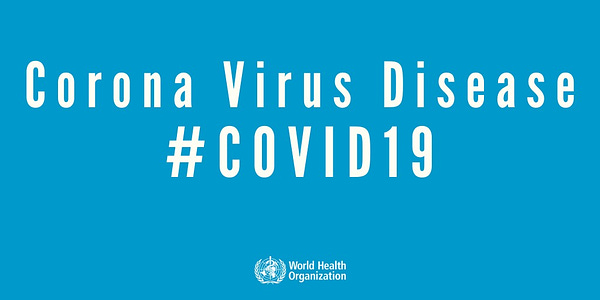
After the WHO’s proclamation most people trying to talk honestly about the virus - whether on television, in the newspaper, on small-time newsletters and blogs, or in basic conversation - switched over to “COVID-19” or referred to it as “The Coronavirus” as illustrated by this great graph from Axios:
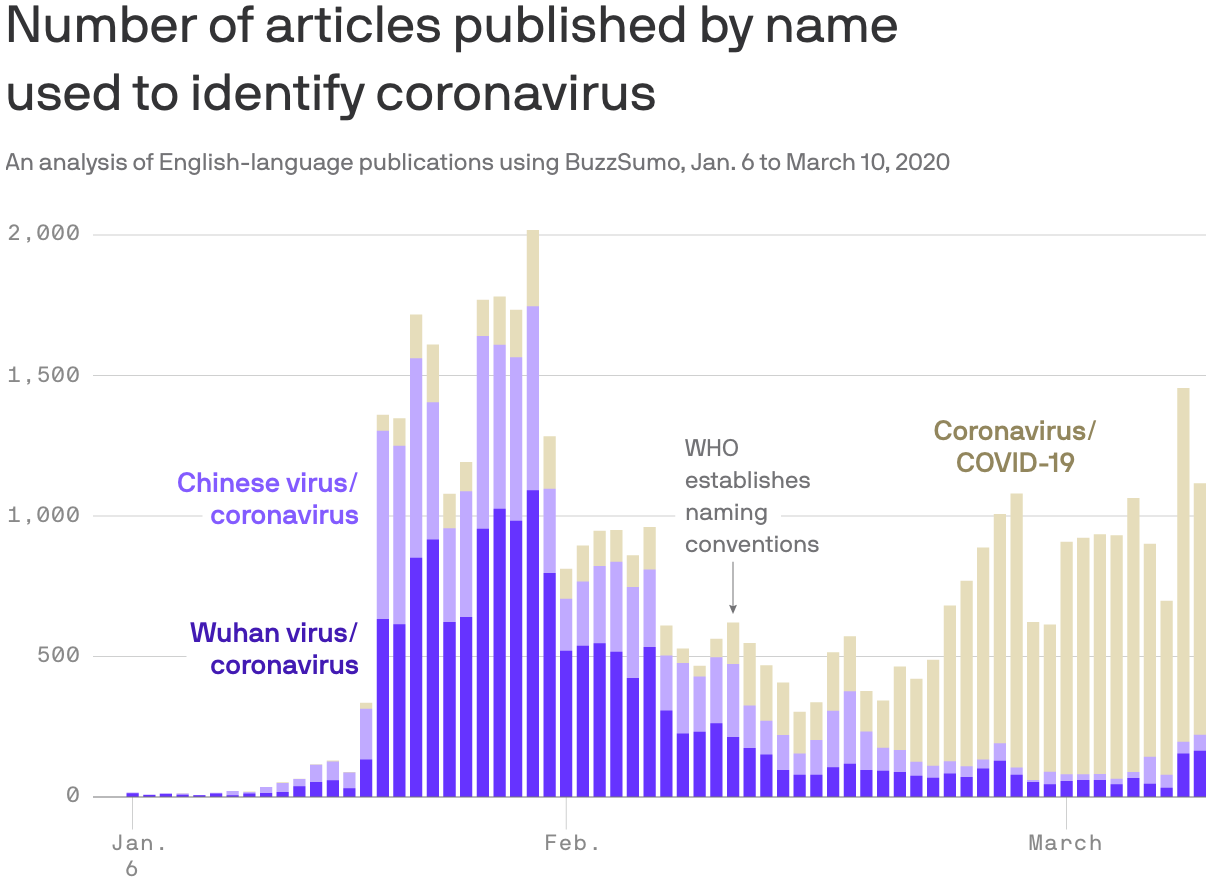
American Stupidity
Inspired by the President and Secretary of State, Mike Pompeo, many Republican politicians, who barely bothered to pay the issue any credence at all initially, refused to grow up, move along, and get with the program and actually ramped up their usage of the phrases “Chinese coronavirus” or “Wuhan virus” or worse within the last few weeks.
I guess they think their refusal to bow to the conventions of an expert-led non-governmental organization like the WHO shows just how straight-talking and American and tough-on-China they really are.


[Note: my first role in politics was as an intern in Judy Chu’s office!]




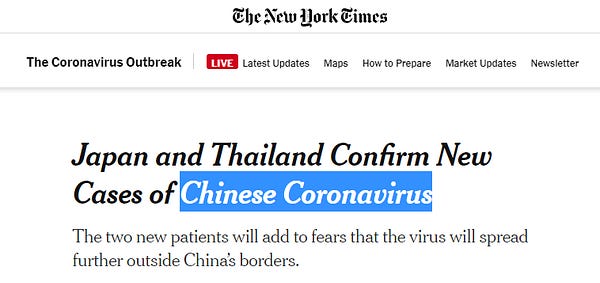
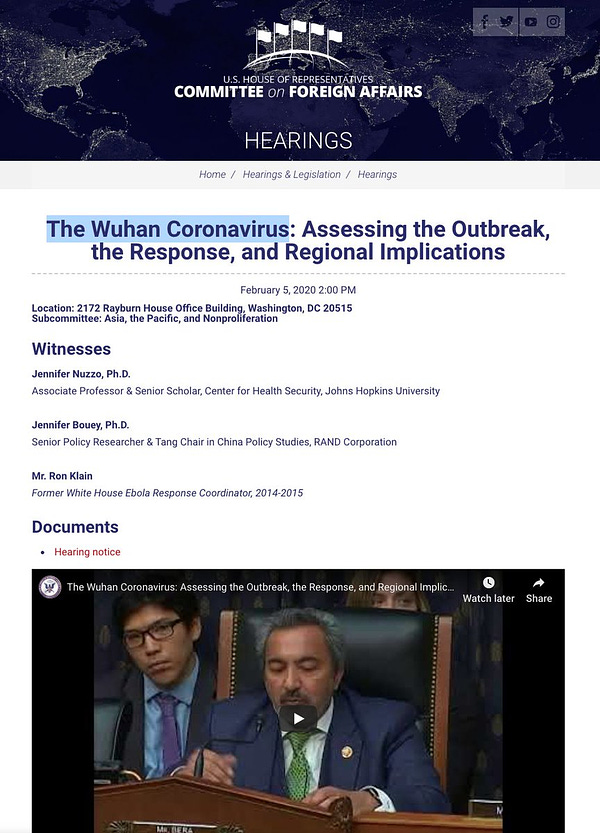
[Note: McCarthy made this tweet ten days into March, but all of his “gotcha” examples were published BEFORE the WHO guidance was issued on February 11]
These insensitive, and very intentional, uses of controversial terms are what’s referred to in politics as a “dog whistle.” (From the book Dog Whistles, Walk-Backs, and Washington Handshakes (2014):
Dog whistle: Political messaging using coded language that seems to mean one thing to the general population, but which to a targeted subgroup means something else entirely. Conservatives are more frequently accused of using political dog whistles to talk past the general public [...] Another group of alleged code words is supposedly mean to appeal to some voters’ inherent racism. The late Republican Party strategist Lee Atwater put the issue bluntly, describing the GOP’s Southern Strategy in a 1981 interview: “You start[ed] out in 1954 by saying, ‘N----r, n----r, n----r.’ By 1968, you can’t say n----r - that hurts you. Backfires. So you say stuff like ‘forced busing,’ ‘states’ rights’ and all that stuff.”
[Note: Atwater was a political genius, and an admitted racist, who invented or perfected many of the hardball tactics still used in American politics today]
The usage of these dog whistles only hides uglier intentions simmering below the service and hints at the more direct words used behind closed doors. CBS News correspondent Weijia Jiang, a self described “Chinese born West Virginia tweeted this out just two days ago:

Along with the incendiary language used by our leaders on television and Twitter has come violence and discrimination in the real world. Violence against Asian Americans in New York has led to investigations by the NYC Hate Crime Task Force. “Racially aggravated assault” was perpetrated by children just fifteen and sixteen years of age in London. And paranoia has devastated business for Chinese food restaurants around Washington DC (h/t, Pat).
Words have power, and American politicians aren’t the only ones who know that.
Chinese Duplicity
Before their citizens had even recovered from the coronavirus devastation (and thanks to the sacrifices of the people of Wuhan and of thousands of incredible medical workers, the Chinese people are indeed well on their way) the Chinese Communist Party (CCP) began working overtime to change history.
The CCP is using the news, rumors, and the internet to deny its role in the pain being felt all across the world. And they’re doing this to enhance their stature on the global stage and place as much blame as possible in the hands of their rivals, the United States government.
It is well documented that the Chinese government made serious efforts to suppress the spread of news about the emergence of a new virus in their country toward the end of 2019. Medical professionals who tried to raise the alarm, late last year, about a new pathogen were told to keep quiet by the government.
Infamously, Wuhan doctor Li Wenliang tried to warn fellow physicians about what he was seeing via a private message on the Chinese social media platform WeChat on December 30, 2019. Days later he was summoned by the local CCP Public Security Bureau (a police station that answers to the CCP) and forced to sign a document accusing him of making false statements disturbing the public order. He returned to work and contracted the virus he was trying to warn friends about. He sadly succumbed to the virus and died on Feb 7, 2020, at age 33.
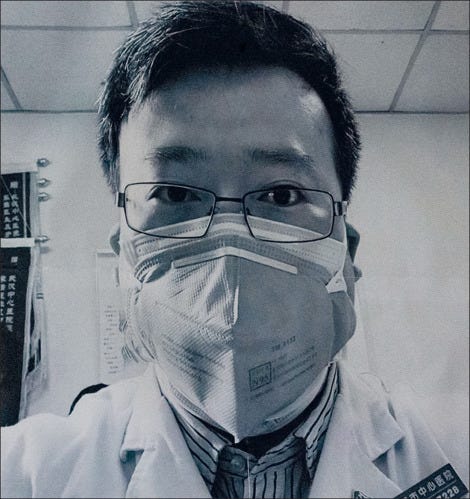
"I was hospitalized on the 12th. At that time, I was still wondering, 'Why is there no announcement of people-to-people transmission, and why are no medical workers getting infected?'" - Li Wenliang [NPR]
Once the epidemic became too much to hide the CCP put a lot of effort into containing the virus. The medical workers of China did an amazing job, people sacrificed their liberty to slow the rate of infection. Many lost jobs, and many lost their lives. But, if the government had acted earlier, and not tried to hide the truth, many fewer would have had to pay that price.
In the last couple of weeks the Chinese Communist Party has been trying to change the narrative on their response to the coronavirus by touting the amazing job they did to defeat it. In late February the CCP’s propaganda office published a book: A Battle Against Epidemic: China Combatting Covid-19 in 2020. The book is meant to be an instruction manual to other nations that highlights the incredible leadership of the great Xi Jinping. And just to make sure that all those across the world could understand the lessons, the book was printed in six languages: Mandarin, French, Spanish, Russian, Arabic, and of course, English.
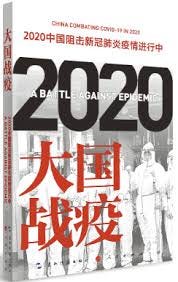
Along with the educational charm offensive China is doing its best to take on the role of the benevolent and deep pocketed foreign friend that the United States has played for so long. China has recently begun reinvigorating downed supply chains and doling out medical equipment to other countries that are going through the pain they went through. They are not doing it out of sheer magnanimity: the CCP has made it clear that they want some credit for their action. A recent Xinhua (CCP controlled news outlet) article suggested that the United States would be “plunged into a mighty sea of coronavirus” if they chose to halt exports of pharmaceutical ingredients used to make medicines and vaccines.
Most egregiously, the CCP has started to actively support the idea that maybe the new coronavirus didn’t emerge in China at all, but was actually planted by the US government. The idea started off as a rumor on Chinese social media and was allowed to spread without restriction for weeks. This alone is significant as the CCP is quick and heavy handed with its internet censorship. Even true things that are in any way critical of the government are often taken down like lightning.
As the rumor that the US military planted the coronavirus during a visit to Wuhan in December developed the CCP has begun to spread it openly and boldly. A prominent Chinese diplomat tweeted this piece of propaganda:

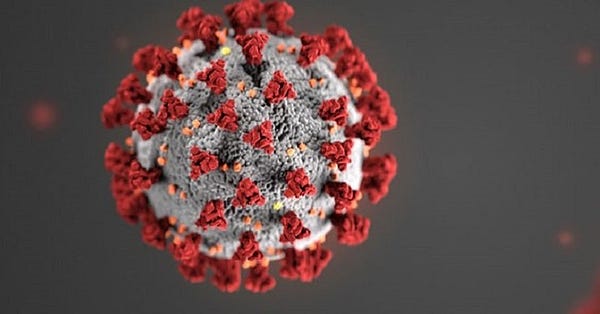
And to put the icing on the cake, the Chinese government has gotten in on the argument over the name of the virus. Similar to the Russians in 2016, the Chinese Communist Party is a sophisticated internet propagandist and follows American political trends closely.
The CCP latched onto a hot-button issue and are using it to their advantage. And they have the advantage of being right. The intentional usage of “Wuhan virus,” “Chinese virus,” or “foreign virus” by our president and other leaders is indeed racist. The CCP wants to use that fact not to make a legitimate moral point, but to draw attention away from their own missteps in this crisis.
In the video below China's foreign ministry spokesman Geng Shuang used our Secretary of State’s language against us, saying that Pompeo's use of the phrase “Wuhan virus” was "despicable":
More Horrors to Come
In my coronavirus essay from early February I compared the emerging pandemic to a 1978 Stephen King horror novel, The Stand. I made the point that this virus (nCov-19 now SARS-Cov-2) and the disease that comes with infection (COVID-19) were nothing to play with but didn’t hold a candle to the monsters of our imagination like the Project Blue superbug from the novel.
Though many have already perished from COVID-19 (nearly 9,000 at the time of publication) and too many more will in the future I still believe this to be true, and am cautiously optimistic about the incredible technology that’s being deployed to attack the problem.
But it’s not only the science and medical concerns that make this pandemic a real-life horror story. It’s the way that we’ve chosen to react to it: with fear, hatred, duplicity, stupidity, and (the wrong kind of) panic.
Racist assaults are on the rise. Gun sales are through the roof. China and the US are deporting each others’ journalists in a bizarre eye-for-an-eye battle that effectively leaves the whole world blind. And the young people of America are refusing to consider others with their actions and are partying on the beach without a care in the world.


If we’re not careful, the coronavirus will continue to bring out the worst in us, when it’s the very best of us that’s needed to prevail.
R




